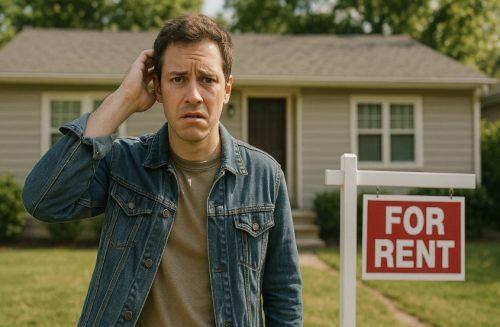When you hear about squatters’ rights, you might assume that anyone who occupies a property for long enough could legally claim ownership, but does this include tenants?
If you’re renting a property in the UK or own one as a landlord, it’s crucial to understand the legal boundaries that separate tenants from squatters. While both may occupy property without payment at times, the law draws a very distinct line between the two.
In the UK, squatters’ rights, commonly linked to the legal principle of adverse possession, apply only under specific conditions that do not involve prior permission to occupy.
A tenant, by definition, has been granted permission to live in a property, whether or not they continue paying rent or have an active tenancy agreement.
This blog will help clarify why tenants cannot legally claim squatters’ rights, how the law protects property owners, and what options exist when a tenant overstays their welcome. Understanding the legal framework will help protect your property rights and avoid costly mistakes.
What Are Squatters Rights and How Do They Work?

Before we dive into whether a tenant can claim squatters’ rights, it’s important to understand what squatters’ rights are in the UK. The term refers to the concept of adverse possession, a legal doctrine that allows someone to claim ownership of land or property they’ve occupied without permission, but only after meeting specific conditions.
Under UK law, a person can apply to become the registered owner of a property through adverse possession if:
- They have occupied the property continuously for at least 10 years (12 years if it is not registered with HM Land Registry).
- They acted as though they were the owner, such as maintaining or securing the premises.
- They did not have permission to occupy the property, this is crucial.
In short, squatters are individuals who deliberately enter and live in a property without the owner’s consent. This is different from tenants, who enter through a legal agreement.
Squatting in a residential property is illegal in England and Wales and can lead to:
- Up to six months in prison
- A fine of up to £5,000
- Immediate removal through court procedures or by the police
However, squatting in non-residential buildings or land is not automatically a criminal offense, unless accompanied by actions such as:
- Causing damage when entering or staying
- Refusing to leave after being instructed by the police, owner, or courts
- Using utilities without permission
- Stealing or fly-tipping
In these cases, civil action must be taken. Property owners can request an Interim Possession Order (IPO) or make a claim for possession to remove squatters legally. Squatters also face legal battles if the property owner objects to their claim.
The entire system of adverse possession is complex and designed to prevent unlawful takeovers, while also recognising longstanding occupation without dispute in very rare circumstances.
Why Tenants Are Not Considered Squatters?

A key misunderstanding is that tenants who stop paying rent or stay beyond their tenancy somehow become squatters. This is not the case under UK law. Tenants are legal occupants who have been granted permission to reside in a property, typically through a rental agreement or licence.
Even if a tenant falls behind on rent or the tenancy has expired, they are not classed as squatters because:
- They had permission to occupy: Tenants enter the property legally through a tenancy agreement or licence.
- Their presence is recognized under tenancy laws: As long as a tenant entered with consent, their occupation is governed by civil law, not criminal trespass or squatting laws.
- They are protected under the Protection from Eviction Act 1977: Which ensures they cannot be removed without proper legal procedure.
Tenants who stay after a tenancy ends are referred to as “stay-overs”, not squatters. Their continued occupation requires the landlord to go through a formal eviction process.
In contrast, squatters:
- Enter property without any consent
- Do not have tenancy agreements
- Are governed by criminal or civil trespass laws, depending on the property type
Here are key reasons why tenants cannot be considered squatters:
- They have a documented legal relationship with the landlord
- Their rights and responsibilities are outlined in rental contracts
- The property owner cannot remove them as they would a squatter, but must pursue legal eviction
So, while tenants and squatters may both occupy a property without rent at some point, the legal status, rights, and removal process are fundamentally different. This distinction is vital to understanding who qualifies for squatters’ rights, and who does not.
Can a Tenant Ever Claim Squatters Rights?

Legally, a tenant cannot claim squatters’ rights under UK law because they entered the property with the owner’s permission. This core fact disqualifies them from applying for ownership under the principle of adverse possession.
For squatters’ rights to apply, the person occupying the property must:
- Have no legal agreement with the owner
- Occupy the space without any form of consent
- Remain in the property continuously for at least 10–12 years without interruption
Tenants do not meet these criteria. Even if they remain in the property after the agreement ends, they are still classified as former tenants, not squatters. Their occupation is subject to civil law, which governs landlord-tenant relationships.
There are no known legal precedents where a tenant successfully claimed ownership through adverse possession after a tenancy. Courts typically side with the property owner, as the original agreement voids any claim to “unauthorised” occupation.
What Happens If You Stay After Your Tenancy Ends?
If your tenancy ends and you remain in the property, this does not make you a squatter. Instead, you’re considered a “tenant at sufferance” or an unauthorised occupant under tenancy law.
In such cases:
- The landlord must serve a notice for possession, such as a Section 21 or Section 8 notice.
- If the tenant refuses to leave, the landlord can apply for a court possession order.
- Failure to vacate after a court order could lead to enforcement through bailiffs or High Court officers.
Here’s what does not happen:
- The tenant is not automatically evicted
- The police are not usually involved unless criminal behaviour is present
- The tenant cannot be removed forcibly without a court order
Staying after your tenancy has ended is not a criminal offense, but a civil matter. That means landlords must follow proper legal procedures rather than treating the tenant as a squatter.
This ensures the process is fair and prevents illegal evictions or disputes. Understanding these steps helps both tenants and landlords avoid confusion or escalation.
Legal Eviction Process for Overstaying Tenants in the UK

When a tenant remains in a property after the tenancy agreement ends, the landlord cannot treat them like squatters. Instead, they must initiate the legal eviction process, which includes several steps.
Here’s how the process works:
- Serve a notice: Typically, a Section 21 (no-fault eviction) or Section 8 (eviction due to rent arrears or breach of terms).
- Apply for a court order: If the tenant does not leave by the date specified in the notice, the landlord must apply to the court for a possession order.
- Use of enforcement officers: If the tenant still refuses to leave after the court order, enforcement agents (like county court bailiffs or High Court officers) may be used to evict them.
Important considerations:
- You cannot use force, change the locks, or cut off utilities to remove a tenant. This is illegal.
- Interim Possession Orders (IPOs) are not applicable to tenants. They only apply to unauthorised squatters.
- Legal procedures must be followed, or the landlord risks fines or imprisonment under the Protection from Eviction Act 1977.
This legal pathway ensures fair treatment for both tenants and landlords, providing a structured method for repossession.
Squatters vs Tenants vs Trespassers: Key Differences
To understand why tenants can’t claim squatters’ rights, it helps to clearly distinguish between tenants, squatters, and trespassers.
Here’s a summary of the main differences:
| Type | Permission to Occupy | Legal Status | Removal Process |
| Tenant | Yes | Legal occupant | Court eviction |
| Squatter | No | Illegal occupant | IPO or possession order |
| Trespasser | No | Illegal entry | Police or legal action |
- Tenants enter with consent and are protected by tenancy laws.
- Squatters occupy without permission and may claim adverse possession after 10–12 years, but only if undisturbed.
- Trespassers are unauthorised short-term entrants, often without intent to remain long-term.
Understanding these categories is crucial for landlords in determining the correct legal approach. While trespassing may be criminal, squatting in residential buildings is also a criminal offence since 2012, making swift legal action possible.
How Landlords Can Prevent Squatter or Overstaying Issues?

Managing rental properties in the UK requires diligence. As a landlord, you can reduce the risk of squatting or overstaying tenants through careful planning and preventative measures. Let’s look at the best strategies:
Background Checks on Tenants
Always conduct reference checks before offering a tenancy. Verify income, previous landlord history, and credit scores. A reliable tenant is less likely to default on rent or stay beyond agreement terms.
Routine Property Inspections
Regular visits (with proper notice) help you assess the condition of the property and maintain communication. These checks help identify early warning signs like unauthorised occupants or neglected maintenance.
Legal Advice Before Tenancy Ends
Consulting a solicitor as the tenancy nears its end ensures you understand your rights. This step is particularly important if you suspect the tenant may not vacate on time or if rent is in arrears.
Avoiding Illegal Evictions
Even if a tenant overstays or is problematic, never:
- Change the locks without court permission
- Remove belongings from the property
- Shut off utilities
- Make verbal or physical threats
Doing any of the above may result in criminal charges under the Protection from Eviction Act. Following due process protects your legal standing and avoids costly consequences.
Preventing issues is always easier than resolving them. With careful screening and proper legal guidance, landlords can effectively avoid most occupancy problems.
Conclusion
The belief that a tenant can claim squatters’ rights is one of the most common misconceptions among landlords and tenants alike. In the UK, the law draws a clear line: squatters are individuals who enter and stay in a property without the owner’s permission, while tenants have legally been granted access, even if they stop paying rent or refuse to leave.
As a tenant, overstaying your welcome does not grant you ownership rights through adverse possession. As a landlord, the solution lies not in treating tenants like squatters, but in following the proper legal eviction procedures.
Clear understanding and lawful action are the best approaches to protecting your property or your rights as an occupant.
FAQs
What’s the difference between adverse possession and tenancy?
Adverse possession involves unauthorised occupation over many years, while tenancy is a legal agreement between landlord and tenant.
Can a tenant refuse to leave and become a squatter?
No, tenants who overstay are still subject to landlord-tenant law, not squatter rights.
Is it illegal to stay after your tenancy ends in the UK?
No, it is not a criminal offence but a civil matter that requires eviction through court.
What legal steps can landlords take if a tenant won’t leave?
They must serve a possession notice and may need to apply for a court order to evict the tenant legally.
How long does it take to evict a tenant legally?
The process can take several weeks to months depending on court availability and the type of notice served.
What if a tenant never paid rent does that change their rights?
No, even tenants in arrears must be evicted through legal channels and cannot be classed as squatters.
Can a squatter claim a property that was once rented?
No, if they entered the property as a tenant, they cannot later claim squatter rights due to prior consent.








